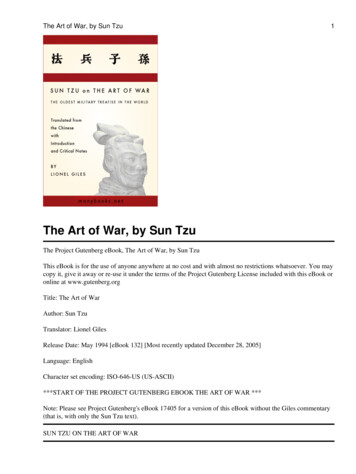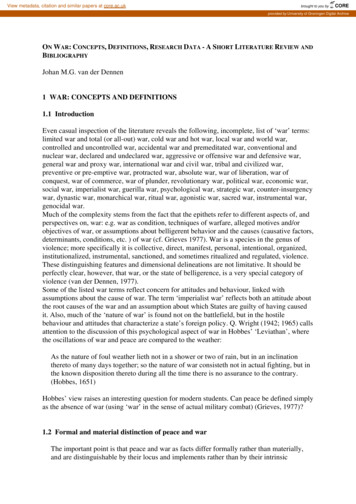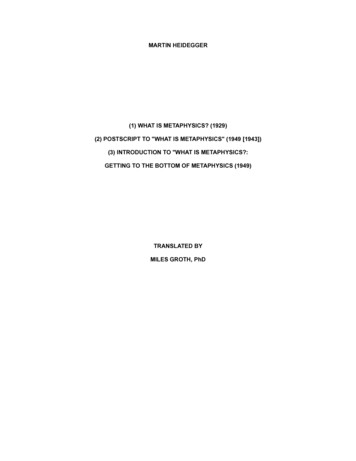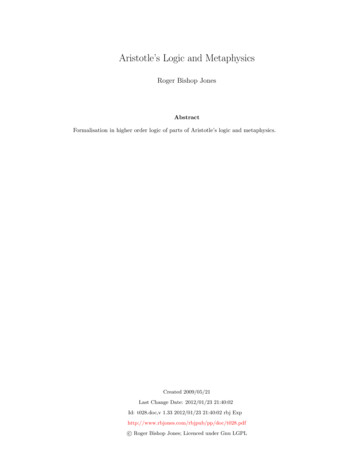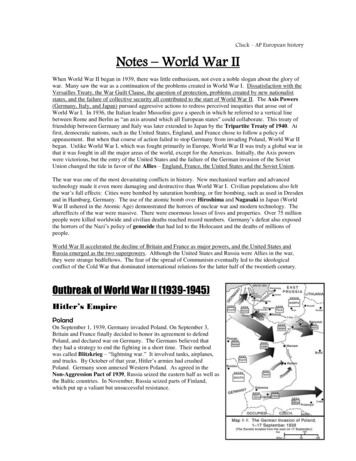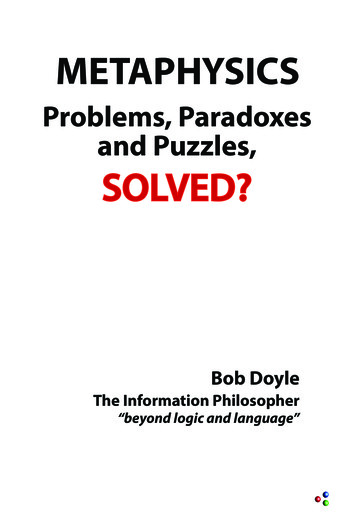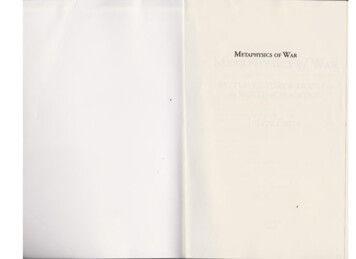
Transcription
METAPHYSICS OF WAR
METAPHYSICSof WARBATTLE, VICTORY & DEATH inthe WORLD of TRADITIONbyJULIUS EVOLAARKTOSMMXI
Contents7IntroductionThird English edition publi hed in 2011 by Arktos Media Ltd.First edition published in 2007 by Integral TraditionPublishing.Second edition published in 2008 by Integral Tradition Publishing. 2011 Arktos Media Ltd.No part of this book may be reproduced or utilised i? any form or yany means (whether electronic or mechanical), in ludmg photoc pymg,recording or by any information storage and retneval sy tem, withoutpermission in writing from the publisher.Printed in the United KingdomISS978-1-907166-36-5SIC classification: Social & political philosophy(HPS);Theory of warfare and military science OWA);Philosophy of religion (HRAS)Editor: John B. MorganCover Design: Andreas Nilsson1. The Forms of Warlike Heroism212. The Sacraliry of War283. The Meaning of the Crusades354. The Greater War and the Lesser War.415. Th Metaphysics of War.476. 'Army' as Vision of the World547. Race and War.598. Two Heroisms669. Race and War: The Aryan Conception of Combat7610. oul and Race of War861 I. The Aryan Doctrine of Combat and Victory9512. The Meaning of the Warrior Element for the New Europe 110I i.Varieties of Heroism118I -r.'Ihe Roman Conception of Victory125Il.ib rationsLayout: Daniel Friberg1,IIII he4 . . 132ecline of Heroism135.140ARKTOS MEDIA LTD.www.arktos.com/ ,//,
Introduction John B. Morgan IVThe Julius vola to be found in this volume is one who has, thufar, remain d largely unknown to nglish-sp aking readers,apart from how he has been described second-hand by otherwriters - namely, the political Julius vola. With the xceptionof Men Among the Ruins, which defines vola's post-war p liticalattitude, a well as the essays made available on-line and in printfrom the Jvo/a as He Is Web site, all of Evola's works which havebeen translated into nglish prior to the present volume havebeen his works on esotericism, and this is the side of his workwith which nglish-language readers are most familiar. The essayscontained in this book were writt n during the period of vola'sengagement with both Italian Fascism and GermanationalSocialism, and, whil Evola regarded these writings as being only asingle a pect - and by no means an asp ct of primary importanceof his work, it is for these writings that he is mo t often calledto account (and nearly always harshly condemned) in the courtof the academicians and professional historians. For this reason"lone, then, it is of great value that these says are being made.ivailable so that nglish-speaking readers can now form their iwn pinion of vola's work in this area. And for those who arelilt 'rested invola a a teacher, then the e essays will serve to ipcn up an area of his work that his hitherto remained largely7
HMETAPHYIta gf' Lt deal of practical advich u 1I1( II,ulllulIl:dl,11111\ ],]siudcn .II I I III pI 11111111II) rem .ml 'I' \ hile reading these essays, howl" II, Illal I';, ola lums .lf made n distinctionbetween the variousal'l-a of culture with \ hich he chose to engag - areas which haveb . .n artif ially divided from each other by the philosophy ofmod rnity, which treats the entire body of universal knowl dgeas a creature to be dissected and examined one organ at a time,beneath a microscope, and thus each part of the creature's bodyi only understood as a thing in itself, without any understandingof how it relates to the whole. Evola's approach to knowledgewas traditional, and therefore it was int grated in nature. For him,there was always only one ubject: Tradition, which, as his friend.Rene Guenon had first defined it, i the timeless and unchangingesoteric core which lies at the heart of all genuine spiritual paths.'Traditionalism', a term which Evola himself never used refers tothe knowledge and techniques derived from sacred texts that theindividual can us to orient himself in rder to know Traditionand in knowing it, thereby live all aspects of his life in accordancewith it. Politics was only of interest to vola in terms of how thepursuit of certain political goal could be of benefit toward thespiritual advancement of a traditionally-mindedindividual, andalso in terms of how the distasteful business of politics might beable to bring modern societies closer into line with th values andstructures to be found within the teachings of traditional thought.During the 1930s, two political phenomena seemed to bearsome hopeful possibilities for him in terms of how they mightbe utili ed as ehicles for the restoration of something at leastapproximating a traditional society: Italian Fascism and GermanNationalociali m (Nazism). At no point, however, wavola astarry-eyed, fanatical revolutionary, filled with idealistic enthusiasm for the cause. Indeed, in 1930 he wrote about Fascism, 'Tothe extent to which ascism embraceand defend [traditional]ideals, we shall call oursel e Fascists. And this is all.' I Reflectingon his political engagements later in life, he furth r wrote:111.Itl \ . dIll,I.u u]ICS OF WAR\\111EDITOR'S FOREWORDPhilosophy, art, politics, science, even religion" were herestripped of any right and possibility to exist merely inthemselves, and to be of any relevance outside a higherframework, This higher framework coincided with the veryidea of Tradition . [My goal was] "to defend ideals unaffected by any political regime - be it Fascist, Communist,anarchist or democratic.hese ideals transcend the political pherc; yet, when translated on the political level, theynecessarily lead to qualitative diff rences - which is to say:to hierarchy, authority and imperium in the broader s nseof the word" as opposed to "all forms of democratic andegalitarian turrnoil.ic nnuunxQuoted by Evola himself in The Path of Cinnobar (London: Arktos, 2009), p. 106.9Taking all ofvola's comments into account, b th before andafter the war, he n ver considered himself to be very much of aFascist. Ie understood from the beginning that both ascism andational ocialism were thoroughly modern in their conception.In 1925, 'vola had already written that Italian ascism lacked a'cultural and spiritual root', which it had only tried to developafter gaining power, 'just as a newly rich man later tries to buyhimself an education and a noble title? He attacked the notionsof patriotism that -a cism tried to inculcate into Italian societya mere 'scntimentality'. He also condemned the vi lence whichMussolini wa using against his political opponents. He labelledthe ascist revolution as an 'ironic revolution'," which left far toomuch of the pre-existing political order untouched (a s ntimentapparently shared by Hitler, who reputedly referred to Italian Fasism with its odd blending of the dictatorial position of 'II Duce'with the Fascist Grand Council and th traditional monarchy, as a'half-job'). In later years he was to observe that, 'In strictly culturalterms, however, the Fascist "revolution" wis simply a joke." Both)Ibid., p. 106.IQuoted in H. T. Hansen's Introduction to Julius Evola, Men Among the Ruins(Rochester: Inner Traditions, 2002), p, 36.{(bid. p. 36.'."file Path of Cinnabar, p. 114.
10M TAPHYSICS OF WARFascism and ational Socialism relied n the masses for theirupp rt, which set them apart from the rule by aristocracy of thetraditi nal world, and ational Socialism was obsessed by a racetheory deriv d from m d rn, scientific concept of evolution andbioI gy which were thoroughly anti-traditional.iven so many problems with Fascism and azism from atraditional per pective, then why did - volaev r show any interest in them at all? The answer lies in the spirit of the times. Bythe 1930s, it was clear that the democratic nations of WesternEurope and the United tates, the Communist oviet nion, andthe fascistic countries were all on a collision course with eachother. And, despite their many flaws, the fascist movements, unlikedemocratic and Communist societie , were at least attempting trestore something akin to the traditi nal, hierarchical order withinthe cial structure of the m dern world - an order which hadgone unquestioned throughout the histories of all civilisations forthousands of years, prior to the onset of modernity. While Fasci m and ational ociali m were thoroughly m dernist in theirconception, Evola belie ed that, given time, they could p tentiallybe used as a gateway to re-establish an rder in - urope based ngenuinely traditional values, and that they might even eventuallygive ris to genuinely traditional social forms which would supercede th m. It is in this context that these essay - some of whichcontain direct references to Fascism, being addres ed to eitherItalian or German readership a they originally were - houldbe underst ad.vola's political ideal wa always the Roman Empire. It isinvoked repeatedly throughout these essays. The Fascists spokefrequently about ancient Rome, just as the Nazis constantlyinvoked the myth of an idealised ordic past. Their understandingof the e ancient wonders, however, was of an extremely superficial ort, which in practice didn't extend beyond constructingnew building in the style of the ancient world, and engendering arti tic styles that were a mere imitation of the la ical era.ola wanted to bring about change on a much deeper level. Hedidn't ju t want a few cosmetic chang s to be made - he want dEDITOR'S FOREWORD11modern-day Italians to actually re ume thinking and behaving astheir ancient ancestors had done. In short, he wanted the italians to become like the ancient Romans - in thought, word anddeed. This is why, for him, Fascism fell far hort of his hopesfor it - in hi writings, he ometim s referred to what he wantedas 'super-fa cism'. By using this term, he did not mean that hewished for more of what Fascism was already offering. Rather,he wa calling for a transcendence of -a cism. He wanted for theFasci t revolution t tunnel inward, into the very soul of eachindividual Italian, and awaken the long-buried racial memory oftheir illustrious Imperial ancestors. When Italy disappointed him,he transferred his hopes to the errnans, particularly in the formof the SdJlltZJtaJ!ei (S.S.), which, with Heinrich Himmler' effortsto fashion it into something akin to a Medieval knightly order,seemed to hold a spark of the ancient Teutonic Knights withinthem. Evola was even invited to deliver a series f lectures torepresentatives of the . leadership in 1938. However, the .S.was fixated upon the azis' purely biological definitions of racialpurity and their belief in the supremacy of the ordic pe ples,and as such they were unimpressed by the ideas of the 'Latin'I vola, who proposed the idea that spirit and character were asImportant to one's racial qualifications as ancestry and blood.lie was politely sent away.As such, vola's hop to influence thepulitical forces of the period in such a way as to implem nt hisplnn for the spiritual and cultural regeneration of Europe wasru:v .r to be realised.The failure of vola's efforts, however, hould in no way beIIl1d '(stood as reducing the relevancy of the essays in this volum1'1 mere relics of purely historical interest. Evola'writing was.1 \ ,I YS directed at the individual, and he believed that g nuine1 IIlg-e had to begin at that level before any meaningful politicalIII .l icial change could follow suit. Furthermore,the root of all"I I ',vola's thinking lay in the unchanging world of Tradition.I III 1 cforc, the attitudes and orientations which he encouraged hisI. "It IS to adopt as a way of preparing for the worldwide strugglI I" Iirn are just as relevant to a traditionally-minded individualI
M TAPHYSICS OF WARhe struggle and conflicts of our" II' I I II. 1111 1 II H' , ,11 'polid al or of an entir ly different sort.II" .1,11111111111'.III hcrorsm and the qualities of the warrior thatI "I, \ I (I til'S II('rI.:1I1arc urely timeless and universal. Indeed,III'V,II11'lll'S if II roisrn',ne can easily see, in the phenomenon«II II) la ' Muslim 'suicide bombers', a supra-personal heroism ofalpid ntical to that of the Japanese kamtkaze pilot that Evolad crib . While it would not be correct to label today's Islamistradicals as 'traditionalists', since their particular interpretation ofIslam has modernist roots in the Nineteenth-century Salaf school,we can still see some elements of a traditional conception of thewarrior in their actions. or instance, Evola describes at greatlength the concept of Jihad, which, as he explains, involves aninner struggle again t one's own weaknesses as well as th struggle against on's external enemies - those whose characteristicsresemble those aspects of himself that the warrior is attemptingto purge. Regrettably, this dual concept of jthad as consisting ofan inward as well as an outward form of struggle has been rejectedby today's Islamist radicals, who believe that the war against theinfidels should take precedence over all other considerations.Fortunately, however, the dual understanding of jihad is still to befound among the Islamic mystics: the Sufis, wh may very wellbe the last guardians of a traditional Islam in the modern world.Despite these differences, however, an attack carried out byan Islamist 'suicide bomber' still retains the essential idea of selfsacrifice, and yearning for transcendence, that is to be found inthe traditional warrior concept. In 'Varieties of Heroism', volaexplains why those Japanese kamtkaze pilots who died while crashing their planes into merican ships should not be regarded assuicides, since the pilots carried out the e attacks with the beliefthat th y were merely giving up this life in favour of a moretranscendent and supra-personal existence. iven that uslim'suicide bombers' similarly believe that they are destined for Paradise as a result of their actions, the bjection to such attacks onthe basis of the Qur'al1's pr hibiti n against suicide is, therefore,ludicrous. uch was, indeed, the motivation behind the famedpil'lllll,,,IidlilllllilItllIEDITOR'S FOREWORD13Ismaili Assassins of Alamut who terroris d the Islamic world ,a well as the armies of the European Crusaders, for centurie .The Assassins carried out carefully-planned attacks on individualenemie without regard for the safety of the assassin, and, assuch, the technique of the 'suicide attack' was their hallmark. ThAs assins were always assured, however, that ev n if they w reto die during the cour e of their attack, they would be rescuedby angel, and sent to dwell in Paradise forever. Although theAssassins, who wer a small offshoot of Shi'i m, are regarded asheretics by other Muslims, we can see the roots (or, perhaps, onlya parallel) of today's 'suicide bombers' in their practices which isentirely consist nt with vola's description of the supra-personalmode of death in combat.It is important for me to clarify that I am referring only tothose attacks carri d out against military or political target. Themass-casualty attack on civilians which have become an alltoo-common occurrence in Iraq and el ewhere in the Islamicworld in recent years, are alien to the provisions of war laid outin traditional Islam, and can be justified only within the moderninnovative doctrines of tokjir - in which one can declare otherMuslims to be apostates - or johil&Jah - which regards fellowMuslims as living in a state of pagan ignorance. It is likewiseforbidden in the Qllr'an to attack the civilian population even ofon's enemy, something which the Islamists have had to p rformtheological acrobatics to circumvent in order to ju tify their bloodyattacks in the West. Certainly, such murderous behaviour, whichIS usually perpetrated out of desperation by individuals ch en(rom the lowest rungs of society, is not something which volawould have defined as traditional or seen as desirable , even inopposition to societies he found detestable. v la' ideal wathat of the ksbatnyo describ d by Lord Krishna in th Bhagavad(,'ila, which has been explained by A. C. Bhaktivedanta warnil'rabhupada as follows:One who gi es protection from harm i called kJbafr!ya .The kshatrfyas are pecially trained for challenging and killing
METAPHYSICS OF WARsometimes a nece sary factor. Itl th ' I' ·ltgiolls law bo k it i rated: 'In the battlefield,.1 I IIlg or k.r/JClIr!ytI, while fighting another king envious ofhill , IS eligible for achieving the heavenly plan ts afterdeath as the brahmanas also attain the heavenly planet bysacrificing animals in the sacrificial fire.' Therefore, killingon the battlef Id on religiou principles and killing animalsin the sacrificial fire are not at all con idered to be acts ofviol nee, because everyone is benefited by the religiousprinciples involved. 61)('( .111:-'('1I'IIglOIISviol'11cISkshatr!Ja, therefore, is not an ordinary man but rather a manof the highe t ari tocratic attitude and behavior. He does notkill out of a desire to fulfil some selfish desire or to bring aboutsome temporary political gain. Rather, a kshatr!Ja fights becausehe knows that it is the reason for his existence, his dharma. Hefights to defend the principles of his religion and his community,knowing that if he carri s Out his duty, regardless of victory ordefeat or ven his own personal safety, he is destin d to attainthe highest spiritual platform. But, unfortunately, few genuinekshatnjas are to be found in the degenerate Kali- Yuga in whichwe are now living.While Evola looked to the past for his under tanding of thegenuine warrior, Evola wa far ahead of his time in his understanding of politics, a were all of the 'Conservative Revolutionaries' inurope during the period between the wars who sought a formof politics beyond the banal squabble among parties that haved minated in recent centuries. n our time, however, we find thatthe ideas first outlined by vola and others are finding new appealamong those seeking an alternative to the seemingly unstoppable,global spread of democratic capitalism. As more people growtired of the bland multicultural (or, more properly, anti-cultural)consumer society that is bing offered as a vision of utopia, itseems likely that vola's writings will only continue to increase6A. C. Bhaktiv danta Swami Prabhupada, Bhagavad-Gita as It Is (Mumbai:Bhaktivedanta Book Trust. 2008), Chapter 2, Text 31, p. 105.EDITOR'S FOREWORD15in rel vance as the cracks of social crisi continue to deepen. Inparticular, 'The Meaning of the Warrior Element for the NewEurope' contains a number of insights which are just as relevanttoday as they wer in 1941. In this essay, vola di cusses theFirst World War in the context of 'democratic imperialism', andthe attempt by the Allies t put to an end the last vestige f thetraditional way of life that were embodied in the Central Powers.We see the exact same phenomenon at work today in the effortsof the United States to spread 'freedom' through military actionin the Middle ast and elsewhere, which i similarly designed toput an end to resistance in the last ar as of the world which arestill actively opposing the culture of materialism with traditionalvalue.s such, we are now witnessing anoth r case of 'democratic imperialism' by which the present-day dem cratic powers,having already succeeded in urope, are attempting to destroy thelast vestiges (and only a vestige, given how profoundly impacted bymodernity the entire world has been over the last century) of thetraditional conception of order. These forces will not be d fearedthrough military means, however, but only by tho e who chooseto embody the ideal of the warrior inwardly as well as outwardly,the world of Tradition being a realm which no amount of forceor wealth can subdue.This introduction will not contain a biographical summary ofHvola's life, as that has already been done extensively by severalwriters elsewhere in the English language (most notabl , particularly in terms of his political attitudes, is Dr. . T. Han en'sIntroduction to Men Among the llilins), as well as in Evola's autobiography, The Path of Cinnabar. However, given that these e saysarc concerned primarily with war, it is worth mentioning thatI': ola did not understand war in a purely theoretical s rise. Evolaserved as an artillery officer in the Italian army during the FirstWorld War, and he would have served again in the Second World\: ar had not the con trover ial nature of his position in FascistItaly interv ned to prevent him from doing o. vola practiced\\ hat he wrote. This is no more evident than in his essay 'Race.uu] War', a passage from which seems like a premonition of
16METAPHYSICS OF WARthe fate that was to befall him in 1945, when he was injured andparalysed for life from the wai t down as the result of an air raidwhile he was working in Vienna. In it, vola mentions a Germanarticle about bombing raids by aircraft, 'in which the test of angfroid, the inuncdiate, lucid reaction of the instinct of directionin opposition to brutal or confused impulse, cannot but result ina decisive di crimination of those who have the greatest probability of escaping and surviving from those who d not'. Herewe may, indeed, be catching a glimpse of the thinking behind hisrefusal to retreat to shelter during air raids, instead choosing towalk the treets as a t st of hi wn fate.Lastly, a word about where these e says originally appeared. In1930, vola established a bi-weekly journal of his own, La Torre,which was to f cus on the critique of Fascism from a traditionalistperspective written by vola as well as other writers. His attackson the failures of Fa cism angered many in the Fascist establi hme nt, however, and the authorities forced a halt to the publicationof La Torre after only five i u.ola therefore realised that, ifhe wanted to continue to attempt to reach an audience of thosewho might be sympathetic to his message of reform, he wouldneed to find well-conn ct d ascist allies who would be willingto publish his writings, and he succeeded. This is the period towhich nearly all of the essay in thi book belong. Evola foundan important ally in iovanni Preziosi, who was the editor of themagazine, La Vita Italiana (see 'Varieties of Heroism'). Preziosi'spublication was also sometimes critical of the Fascist regime, butPreziosi himself had earned Mussolini' trust and respect, andwas thus allowed more freedom of content than most others.(Acc rding to vola it was also rum ur d that Preziosi possessedan archi e of materials which, if made public, would embarrassmany of the - ascistleaders.)? Preziosi had been an admirer ofEvola's La Torre, and he was also a friend of Artur Reghini, thegreat Italian e ot ricist who had been vola's mentor and collaborat r wh n he first began studying spirituality and mysticism.He agreed to begin publishing vola's writings in his own j urnal,-0a7The Path a/Cinnabar, p. 110.EDITOR'S FOREWORD17and starting in 1936 he also funded many of vola's trips to thercountries, which he was making in an effort to build a networkof contacts from among various' onservative Revolutionary'organi ations all over Europe, in keeping with his hopes at thetime of preparing a European - rath r than a narrowly Italian elite which might one day implement his' uper-Fascisr' (or, as hehimself put it, 'Ghibellin ') ideals for the entire Continent. Evolahims If wrote 'My idea was that of coordinating the various elements which to some extent, in Europe, embodied traditionalistthought from a political and cultural perspective." This desire isquite evident within the page of this book, as - volaconstantlyrefers to Aryan civili ation, and cites refer nces from the whole( f European culture and history, rath r than focusing exclusivelyon the Italian tradition, as most ascist writer , with their moreonvcntional sense of nati nalisrn, were doing.Prezio i also introduced Evola t Roberto arinacci. Farinacciwas a Fascist who had a personal relation hip with Mussolini,and he was the chief editor of If Regime FaJl1Jla (see th first sixessay as well as 'The Roman C nception f Victory'), a journal\ hich was an fficial publication of the Fascist Party. Farinacci\ ;1 indifferent tovola's past troubles with the regime, and he".1l1ghtto elevate the cultural aspirations of the Fascist revolution.I() rhi end, he granted Evola a page of hi journal every other\ cck, in which he was giv n carte blat/che to write on whate er-ubjcct he wished. his page, which began to appear in 1933, wa( uutlcd 'Diorama ilosofico' (philosophical Diorama), and it was.uhtidcd 'Problems of the pirit in Fasci t thies'. arinacci usedIllS influ nee to deflect any attempt to rebuke Evola for writingd Ulut L'ascism from a critical perspective. 0 it was that vola wasI" '11 an unassailable position from which to voice his observaIlnllS. This situation was to continue for a full decade, until 1943.I I ('tlllcntly, vola wrote the contents of the 'Diorama' himself,I'lit II ' also used it as a forum to highlight like-minded thinkers, ofII II ;1 literary as well as a political inclination, whom he wished." 111 ornote.hus, by xamining the history of Evola's effort toII11/1' I'llth of Cinnabar,p.155.
ETAPH Y ICS OF WARp,d.1I I, 1"1111"ill\ 11111IIII Ii IC' h tllIllng the Fasci t era, we can11111I 1111.111".1111'ldl II ollwir'lationshiptoFascismingen I ,I 111111'111II \\Ily It ann t be said with complete accuracyd,,, I \ ilL. \\"'1('1111-I' a l-as ist r an anti-Fascist. The most truthful11\\ IllS Iha I I vola saw in Fascism a possibility for somethingb 'II 'I, I IIt t hat this possibility was one that remained unrealised.l-or those newcomer to "'vola who are seeking to understandthe totality of his thought, these essays are not the ideal place tostart. he foundation of all of his work is the book which waspublished shortly before the essays in this volume were written:RevoltAgainst theModern Wodd. This book lays out the metaphysicalbasis for all of his life's work, and one should familiarise himselfwith it beforefeading any of Evola's other writings. It should alsobe made clear that these ssay were by no means vola's la t wordon the subject of politics. Readers interested in where Evola'spolitical thought ended up in the post-war years should consult hisbook Men Among the Rttins, in which he outlines his under tandingof the concept of apoliteia, or the 'apolitical stance' which he feltwas a necessary condition for those of a traditional inclination toadopt in the age of Kali-Yuga - the la t, and most degenerate agewithin the cycle of ages a understood by in the edic tradition,and in which we are currently living. .Apoliteia hould not be confused with apathy or lack of engagement, however - it is, insn ad,a special form of engagement with political affairs that does notconcern itself with the specific goals of politics, but rather withthe impact of such engagement on the individual. This is not theplace for an examination of this idea, however, as the essay inthis book were written by a youngerola, who felt that therewas still a chance of restoring something of the traditional socialorder via the use of profane politics. Still, it is worth noting thatin the very last e say in this volume, 'The Decline of Heroism',which was written not long before Men Among the futins, we cansee something of the state of vola's mind immediately after thewar. Pessimism was something always alien to vola's conceptionof life, but in this essay we can see vola surveying the political forces at w rk in 1950 and r alising that none of them canEDITOR'S FOREWORD19possibly hold any interest for those of a traditional nature. Withthe destruction of the hierarchical and heroic vision of Fascism ,nothing was left t choose from on the political stage but thetwo competing ideologies of egalitarianism: democratic capitalism and Communism, both of which sought to dehumanise theindividual. Moreover, vola 0bserves that war in the technologicalage has been reduced to the combat between machinery, and, assuch, the opportunities for heroic transcendence offered by warin earlier times are no longer available. Therefore, the strugglefor an individual seeking to e perience heroism will not be oneof politics, or even of combat n the battlefield, but rather, it willconsist of the heroic individual in conflict with the phenomenonof 'total war' itself, in which the idea of humanity faces possibleannihilation. This is, indeed, the predicament in which we haveall found ourselves since 1945, the year when humanity not onlyharnessed the ability to extinguish itself, but also began to facethe pro pect of becoming lost within ever-multiplying machineryof our own cr ation. With no significant political forces opposing the conversion of our world into a uni ersal marketplace, theconflict of our time is the struggle to retain one's humanity in anincreasingly artificial world. That is the only battle that r rains anyg nuine significance from a traditional perspective.Most of the footn re to the texts were added by myself. Asmall number of footnote added by .vola himself were includedwith some of the essays and have been so indicated.
The Forms of Warlike Heroism'The fundamental principle underlying all justifications of war,from the point of view of human personality, is 'heroism'.War, it is said, offers man the opportunity to awaken the hero whosic ps within him. War breaks the routine of comfortable life; bymeans of its severe ordeals, it offers a transfiguring knowledge ofhfc, life according to death. The moment the individual succeeds111 living as a h ro, even if it is the final moment of his earthly life,weighs infinitely more on the scale of value than a protractedIistcnce spent consuming monotonously am ng the trivialitiesr] cities. From a spiritual point of view, these possibilities makelip for the negative and destructive tendencies of war, which areu u: sid dlyand tendentiously highlighted by pacifist materialism.\ .11 make one realise the relativity of human life and thereforelollthe law
2. The Sacraliry of War 28 3. The Meaning of the Crusades 35 4. The Greater War and the Lesser War. .41 5. Th Metaphysics of War .47 6. 'Army' asVision of the World 54 7. Race and War. 59 8. Two Heroisms 66 9. Race and War: The Aryan Conception of Combat 76 10. oul and Race of War 86 1 I. The Aryan Doctrine of Combat and Victory 95 12.

